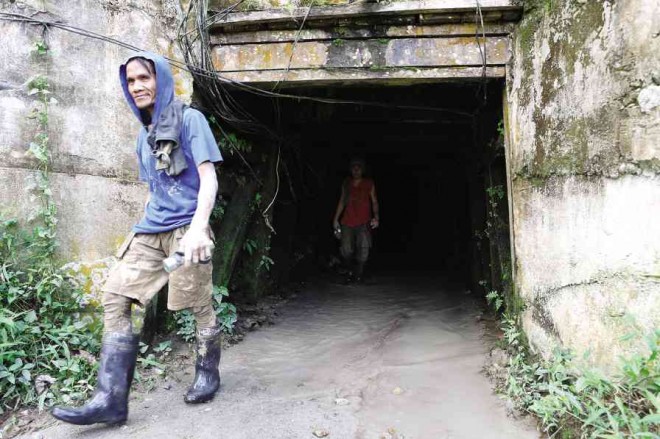A template for small-scale mines
(First of two parts)
T’BOLI, South Cotabato–Except for a few mine workers carrying bags of ore out of the dark, muddy tunnel, the mouth of the Minahang Bayan in Barangay Kematu looks deserted and empty late morning of a weekday. But village chair Mansueto de la Peña says it is only because close to 200 workers are already beneath the portal in a nebulous network of tunnels.
“Toward sunset, this whole place teems with people,” De la Peña says of the 21-hectare Minahang Bayan in T’boli, one of the gold-rich towns in South Cotabato province. “That’s the time when the mine workers go out.”
Now, the Minahang Bayan, which curiously sits inside the 84-tenement claim of Canadian-owned Tribal Mining Corp., is the only small-scale mining site in the country fully monitored and regulated by the local government.
“While other provinces in the country are clearing their area of small-scale miners to allow large-scale miners to come in, we are helping small-scale miners develop because we recognize them as the main drivers of the economy,” says Seigfred Flaviano, designated head of the provincial environment and management office.
First-class town
“Small-scale mining has turned T’boli into a first-class municipality,” Flaviano says. The status means an annual income of at least P55 million. Based on the 2010 census, the town has a population of 79,175.
In the Philippines, small-scale mining is not recognized formally and is still considered an informal sector. “But in South Cotabato, we are trying to formalize it, to develop the capacity of small-scale mining operators because we believe in their contribution to the economy,” Flaviano says.
Discovered in the late 1980s, Kematu’s mining area forms a large part of T’boli’s gold rush site that had once attracted droves of eager prospectors. Exploration estimates of South Cotabato’s gold and copper ore reserves reach 2.5 million tons in one municipality alone.
In 2010, the provincial government passed the Environment Code, banning open-pit mining and effectively barring big companies, such as Sagittarius Mines Inc., from developing their projects.
Gov. Daisy Avance-Fuentes issued Executive Order No. 37 in 2013, intensifying small-scale mining permitting and safety regulations. Under that directive, people who want to work in the mines must secure identification cards in a system that helps eliminate the entry of minors. But they can only secure their IDs after going through a series of training on mine safety, environment protection and disaster preparedness.
‘Bayanihan’ spirit
Tapping the Filipino spirit of “bayanihan,” the provincial government pooled resources from government and nongovernment organizations together to help improve the capacity of small-scale miners, giving them access to training, technology and, hopefully, credit in the future.
The switch to regulated mining activities did not come easy, Flaviano says. In 2010, the provincial government closed down all extracting operations within the Minahang Bayan site following mining accidents and other problems.
But people desperate for a source of income petitioned the local government to be allowed to operate again. “It was their main source of livelihood, so the provincial government called for a series of dialogues,” Flaviano says.
The following year, the government relented but set terms that operators pay their taxes, take steps to protect the environment and to assume other social responsibilities to the host communities, and stop the illegal practice of “banlas” (hydraulic mining), which is deemed destructive.
Flaviano says regulated small-scale mining has worked two ways for the province and the miners: While they contribute to the local government coffers through taxes, the government helps ensure safety in the mining area and promote scientific technology to sustain industry income.
Job opportunities
The government earns only a measly amount from large-scale mining operations, Flaviano says. Small-scale mining, however, has opened chances for some indigenous peoples to earn a living.
“We are not getting that much from large-scale mining, which will only turn our people into mine workers,” he says.
Small-scale miners pay as much as P1,000 in taxes per ton of gold ores. As a result, the mining revenue of the province doubled from only P4.8 million in 2010 to P9.75 million in 2011, doubling again to P15.79 million in 2012.
South Cotabato has individualized the issuance of small-mining contracts, increasing compliance to environment laws to as much as 90 percent among operators.
The new system has allowed each contract holder to take responsibility of his actions, De la Peña says. “Unlike before when a violation by one of the members of the cooperative would cause the whole cooperative to suffer.”
From only six mining contracts and five processing permits registered by the province in 2010, there are now 159 mining contractors and 105 gold processors. (To be concluded)















